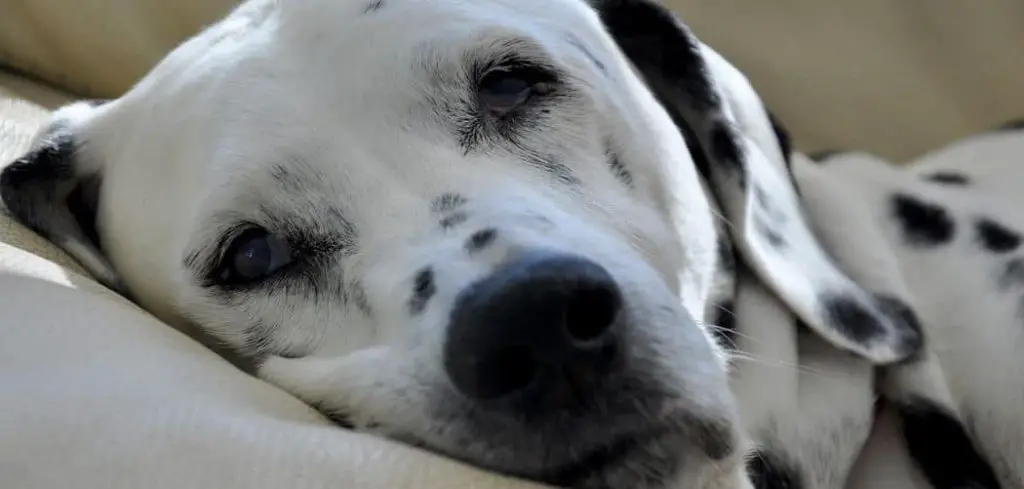If your old dog is lethargic not eating or drinking, it could be a sign of a serious health issue that needs immediate attention.
Senior dogs naturally slow down with age, but when they suddenly stop eating, drinking, and show little to no energy, it’s a red flag.
Dehydration and malnutrition can set in quickly, especially in older dogs with underlying conditions.
We outline the reasons this may be happening, what you can do at home, and when to act fast and call your vet.
Old Dog Lethargic Not Eating or Drinking: Why It Happens
When your old dog is lethargic not eating or drinking, potential causes include severe pain, kidney or liver failure, end-of-life decline, dental disease, heart problems, or a sudden medical crisis like bloat or internal bleeding. These symptoms often signal that your dog’s body is struggling to function properly.

Old Dog Lethargic Not Eating or Drinking: Common Causes
Kidney or Liver Failure
Chronic kidney disease (CKD) and liver disease are common in older dogs and can lead to a complete shutdown of appetite and thirst as toxins build up in the bloodstream.
Signs may include:
Vomiting or nausea
Bad breath (ammonia smell)
Pale or yellow gums
Increased or decreased urination
Dehydration worsens rapidly without drinking.
Bloodwork is needed to diagnose and manage these conditions, which may involve fluids, diet adjustments, and medications.
End-of-Life or Age-Related Decline
Sometimes, an old dog stops eating and drinking due to natural aging or being near the end of life.
Their body may simply begin shutting down, especially if they’ve battled chronic illnesses.
Behavioral signs:
Disinterest in surroundings
Unwillingness to move or engage
Sleeping excessively
Unresponsiveness to food, water, or touch
Your vet can help assess whether palliative care or humane euthanasia is the most compassionate choice if suffering is present.
Related: My dog is lethargic and not eating (Causes and when to worry)
Pain or Injury
Dogs in pain often lose their appetite and may avoid water due to discomfort when standing or moving.
Arthritis, internal injuries, or even undiagnosed tumors can all cause your dog to act withdrawn and stop eating or drinking.
Other pain indicators:
Whining or groaning
Hunched posture
Trembling
Restlessness or isolation
Pain relief can sometimes restore interest in food and water. A vet exam is essential for proper diagnosis.
Dental Disease or Mouth Pain
In older dogs, dental infections, loose teeth, or oral tumors can make eating and even swallowing water too painful.
Look for:
Drooling
Bad breath
Bleeding from the gums
Pawing at the mouth
A veterinary dental exam can confirm the issue. Treatment may include antibiotics, dental cleaning, or tooth extractions.
Heart Disease
Heart failure in older dogs may cause them to stop eating or drinking, especially if they feel nauseous or short of breath.
Common signs:
Persistent coughing
Fatigue after mild activity
Swollen belly (fluid retention)
Labored breathing
Cardiac medications and fluid management may help stabilize symptoms and improve quality of life.
Bloat or Emergency Conditions
Gastric dilatation-volvulus (GDV), also known as bloat, is a life-threatening emergency that occurs when the stomach twists and traps gas.
Urgent signs:
Swollen, tight abdomen
Restlessness, pacing
Retching without vomiting
Rapid breathing and collapse
GDV mostly affects large, deep-chested breeds and requires immediate emergency surgery.
Any time an old dog is lethargic not eating or drinking and shows these signs, get help immediately.
What to Do
Here are urgent steps to take if your old dog won’t eat or drink:
Check hydration – Gently lift the skin over the shoulder; if it doesn’t snap back quickly, your dog may be dehydrated.
Offer water with a syringe or spoon – Try ice cubes or low-sodium broth.
Try tempting soft food – Warmed wet food, boiled chicken, or baby food (without garlic/onion).
Keep your dog comfortable – Use a soft bed and avoid stress or overstimulation.
Document symptoms – Track when they last ate, drank, urinated, or vomited.
If your dog hasn’t eaten or drunk anything for more than 12–24 hours, call your vet without delay.
When to Call or Visit Your Vet
Seek veterinary care right away if:
Your dog refuses water for more than 12 hours
They appear very weak or unresponsive
Vomiting, diarrhea, or labored breathing is present
There’s sudden collapse or abdominal swelling
Signs of pain or confusion emerge
Your vet may provide IV fluids, blood tests, or imaging to diagnose the issue. In severe cases, hospitalization may be required.
Related: My dog is drooling and lethargic (Here’s why)
Key Takeaway
If your old dog is lethargic not eating or drinking, it may be more than just old age—it could be a sign of serious illness or a life-threatening emergency.
Aging dogs deserve comfort and care, especially when they’re struggling. Acting quickly could mean the difference between recovery and decline.
Always trust your instincts and consult your vet as soon as these symptoms appear. Your dog depends on you to speak up when they can’t.
